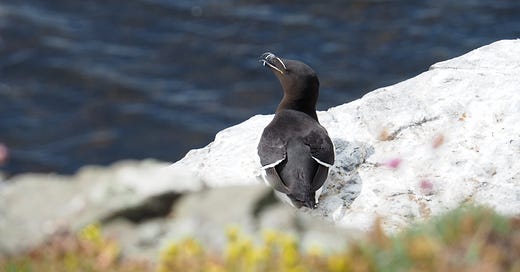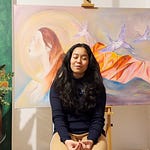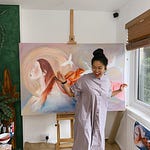The Poet
The rhythm of the footsteps
Nor the chatter will not
Shake her now
The steady beat of the kora
Invites the words to string into sentences
The warm drink is
Her safety blanket
When her mind is empty
The food is a source of nourishment
For her body
A comfort and a luxury
To afford the inner kind of nourishment
That a regular landing of the page brings
She is slowly becoming a part of the furniture
In this busy cafe
To be hardened by practice
To be broken and built up by
The admission of herself
There is a poet in the cafe
Now she is finally writing
She has already arrived
She is finally writingI actually don’t know the first time I wrote poetry. I can only trace it back to a written poem I have in a book. When I went on a study abroad trip to the US for a semester back in 2013, someone gave me a present as part of a Secret Santa we were doing before Christmas. For my gift, I received a small square book. It had a soft blue cover to the front and back. Indented to the blue was a series of words repeating the same thing: “write.” So if you look at the cover, all it had was a series of “write, write, write, write, write….” And on the first page of the book, my secret Santa had also written:
For all the places you’ll go
For all the people you’ll meet
For all the sights, sounds and feels
A place to forever store them
I never wrote in that book until January 2017. It was a love poem.
A few years forward, when I really began to have a regular practice of writing poetry, I realised how healing it was. What began as a way of expressing pain and confusion, turned into a myriad of poems talking about power and love. What continued were poems about having faith, trust and surrendering to the mysteries of life.
The more I wrote, the more my mind opened. I could not un-do what happened. Soon enough I realised that the words I was writing down had power themselves. I realised that every word I wrote could not only be used as a way of acknowledging my experiences, but also they are influential in how I perceived my reality.
If I wrote a word that did not hold the vastness of my experience, it didn’t feel right. This is because the page isn’t a person to whom I have a prior relationship with or a person with whom I felt all kinds of obligations. The page wasn’t a person I was trying to impress. I had only myself to answer to on the page. And if I wrote something that didn’t feel quite right, I knew it.
Therefore, I had to be honest with myself. And the page forced me to be honest. It taught me to think wider and bigger.
I also started to observe how my poems had an effect on me. Every word I used was an opportunity to either contract or expand. If I wrote a sad poem, it was intentional so I could allow feelings of pain to flow through me. But I couldn’t end it there because I didn’t want to feel sad forever.
Therefore I would then write another poem. One of courage and understanding. One of holding the bigger questions to life’s humanly experiences; of both limitations and possibilities.
I knew that with every word I used, the power was in the tip of my pen to transform my perspective of the experience. I also realised that if I was feeling a certain way in life, I could not just think from a bias perspective.
The rhyming words, the vocabulary, the structure of the poem questioned me to think bigger, to dream bigger, to feel bigger. I had realisations such as this one:
“That if I had a particular way of experiencing and feeling and doing things in life, then the opposite way of experiencing, feeling and doing things must also be equally true.”
Very simple but for me, it was profound. It meant that if I was feeling negative about something, I couldn’t deny in my mind that the opposite must also be equally true- that a positive or even a peaceful outlook was possible, and equally real.
At present, I am also shifting into something similar but slightly different. I spent the past few years writing about me. My life experiences, my emotions, my learnings. And somehow this is translating into my understanding of others.
I am currently writing a book named, “The Faces We Hold and The Faces We Meet.” The book in itself is accidental- both in theme and name. However, it came about from realising that suddenly, I was not just observing myself but others around me.
My close friends, my family members, even the strangers I meet! And there on the page, I write to capture a particular essence I observe, feel and meet. I capture a particular essence of who they are and sometimes also the entirety of who I feel and observe they seem to be.
Of course, like with all art forms, everything is subjective. But like a photographer taking a snapshot of a moment, I write a poem to capture the moments of loved ones and strangers.
Just as writing poetry taught me to see bigger, it is teaching me of the similarities in us all. Perhaps, more so than the differences. I see that, in a poem I write about my friend, my mother or a stranger, there lies an aspect in me that is the same, if not similar.
I have met this particular “face” before and it is from this place that I write- both in observation and in intuition. This poetry is allowing me to understand people. Perhaps even people that I find unpleasant. Simply because I know from my past years of writing that a particular capture is also not the entirety of their character and essence.
Last week, I wrote a newsletter about “The Selves We Meet” Coincidently, even before a friend of mine knew about my topic of choice and even before my understanding became whole, about why I wrote what I wrote, she came to visit me and we had a great conversation about this very topic.
We shared honestly, as honest as I am to the page, about the pieces of ourselves that we find are opposite. Pieces that serve us in different ways but yet somehow we feel the struggle to unify, to strengthen a weaker characteristic and to stabilise our default thinking and behaviour. Something that served as a tug of war inside us.
Suddenly, out of my friends mouth came this phrase that was so very enlightening,
“I would call it the tug of peace.”
And, right there and then, in that moment, instantaneously, my experience to my many selves came to a halt. There, indeed, was nothing but a feeling of understanding- of peace. Right there, in that moment, all I felt was perfection. Both in myself and in her. My relationship to myself changed. Right there, I realised that she indeed was perfect as she is. All was happening at the right time. She was unfolding, growing and evolving perfectly, like the perfectly sinuous lines of a drawing. And I also came to know that, indeed, so was I.
This is how powerful language and words are. Turning to the page is spending time with ourselves and I am learning that in a world like ours, where we can give ourselves over to many external musings, poetry and art is where I converse with myself- the parts of me that I know and the parts of me that I do not yet know but am willing to take the time to find out. In turn, I create a belonging in this world that expand my perspective of this life and the people that inhabit this world. Everything is perfect. And there is a part to everyone, despite the seemingly chaotic mannerisms and their doing, is indeed perfect.
Contemplations
:
How are you using language in your life?
What practices allow you to connect with yourself?
What is allowing you to have a bigger perspective and understanding of our human experience?
















Share this post